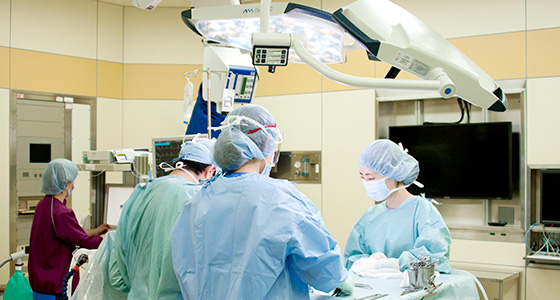- HOME
- Department
- Surgery
Surgery

(1) Overview
Our surgical department specializes in a wide range of gastrointestinal diseases and breast diseases. Our number of surgeries totals around 1,300 surgeries per year*1. Our experienced specialists are able to treat most gastrointestinal cancers safely at our hospital, including but not restricted to cancers of stomach, colon, rectum, food pipe (oesophagus), liver, pancreas, biliary tract and breast.
Our specialists also treat some of the most common surgical conditions such as gallstones, blockage/obstruction of the intestines, hernia, anal abscess and hemorrhoids.
We perform a large number of emergency abdominal surgeries – up to 120 per year*2. Our specialists are able to deal with conditions including but not restricted to appendicitis, gastrointestinal perforations, ileus, cholecystitis and diverticulitis.
Patients can feel reassured that our specialists will be able to deal with all the common diseases to more complicated gastrointestinal diseases at NTT Medical Centre Tokyo.
- *1 Surgeries performed from January 2021 to December 2021 is 1,185.
- *2 Emergency surgeries performed from January 2021 to December 2021 is 126.
(2) Policy
Striving for State-of-the-Art Surgical Practice
Our medical technologies are steadily advancing day by day. It is therefore extremely important that we continue to improve our surgical techniques while incorporating some of the most advanced surgical technologies available. Our surgical team consists of a wide range of surgical specialists including endoscopically qualified surgeons. Our team continues to pursue expertise in our surgical specialist fields.
Efforts to Build Professional and Effective Surgical Teams
The current period marks the turning point from surgery focused on conventional abdominal techniques to the era of non-invasive laparoscopic surgeries. We are currently expanding the application of laparoscopic surgical techniques to many other abdominal diseases, led by qualified surgeons certified by the Japanese Endoscopic Surgical Society.
We also strive to provide safe and high-quality surgeries through our experienced staffs who are certified by the Japanese Surgical Society, Japanese Society of Gastroenterological Surgery, the Japanese Society of Coloproctology, the Japanese Esophageal Society and the Japanese Society of Hepato-Biliary-Pancreatic Surgery*3.
- *3 As of January 2022
Responding to Surgical Emergencies 24/7
We proactively accept and treat patients who need emergency surgical treatments 24/7 including at night and on holidays. Patients who are admitted as a surgical emergency will be looked after appropriately under the care of ICU (Intensive Care Unit), HCU (High Care Unit) or the general ward depending on the patient’s condition at the time.
(3) Our Strengths
We Plan for Your Surgery to Fine Details
We discuss surgical indications and procedures in our surgical cases by all the department staffs twice a week. Cases considered for endoscopic surgeries or other medical treatments will be discussed regularly at a joint conference with our Gastrointestinal Endoscopy and Hepato-Biliary-Pancreatic Medicine teams. For more advanced cancer cases which were previously deemed ineligible for surgical treatment, we may discuss the possibility of surgical treatments if the medical treatments or chemotherapy were effective in shrinking the cancer cells.
Valuing Team-Based Approach
Team-based medicine is central to providing our patients with high quality surgical care. Not only we work together with other specialists, our team is continuously supported by professionals including doctors, nurses, pharmacists, clinical engineers, radiographers, dietitians, physical therapists, social workers and clerical staff.
Our NST (Nutrition Support Team) specialists are responsible for supervising the nutritional management of each patient. We have set up a system to monitor the quality of our care, through regular visits by our Palliative Care team and the Infection Control team.
Under the team medicine approach, the sharing of medical information effectively across the teams becomes especially important. With regard to the preoperative and postoperative management, we share the information by utilizing the same clinical pathways (inpatient care plans) between the teams.
We Keep You Safe via Effective Infection Control Measures
In order to provide high-quality surgical care that is safe, but at a reasonable cost, it is important to have an appropriate system in place for the perioperative infection control.
Since 1998, we have been actively utilizing SSI (Surgical Site Infection) surveillance system as an effort to reduce surgical site infection. This infection control surveillance system would continuously monitor surgical infections and the rate of surgical infection within our hospital.
We are currently actively involved in the management of the SSI surveillance organized by the Japanese Environmental Infection Society. We are involved in the management of hospital acquired infection surveillance led by the Ministry of Work and Labour in Japan through the same initiative. We endeavor to disseminate the SSI surveillance system in Japan and continuously improve the quality of medical care here in Japan.
Message For Our Patients
We cannot emphasize sufficiently of the importance of having a regular health check-ups in order to find disease at an early stage. When any abnormality is found at the check-ups, we will endeavor to provide a thorough consultation, examination and treatment when appropriate. We would like you to bring a referral letter from your primary care provider as much as possible when visiting us.